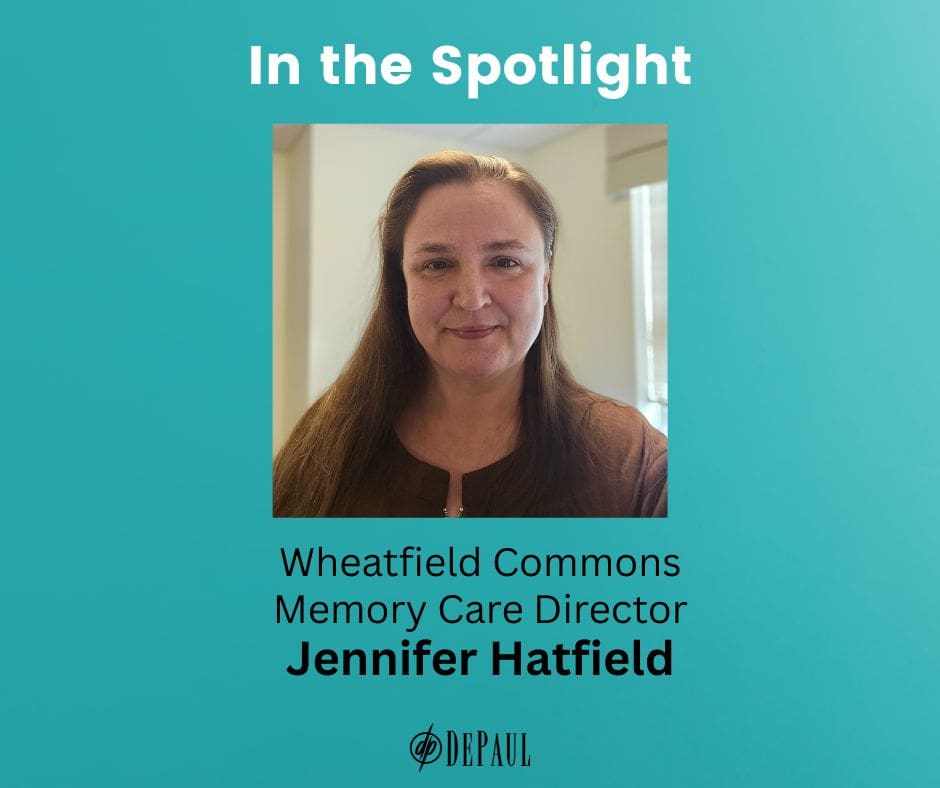National Alzheimer’s Awareness Month Spotlight: Insights from a DePaul Memory Care Coordinator
National Alzheimer’s Awareness Month is an opportunity to honor the millions of individuals and families affected by the disease and other forms of dementia.

At DePaul, we’re proud to support residents, families, and staff who face this disease with courage and care every day. Wheatfield Commons Memory Care Coordinator Jennifer Hatfield shares her insights into raising understanding, reducing stigma, and highlighting the importance of compassion and connection in every stage of the journey.

What inspired you to work in the memory care field and what motivates your dedication to your role?
My older sister Renee has always been my inspiration. She displays selflessness and a willingness to help anyone in need. She worked in a nursing home and now that I work with our seniors at Wheatfield Commons, I can see why she loved it. My role requires compassion, patience and understanding of the challenges that individuals with Alzheimer’s disease and dementia face. One day, any of us may be in the same place so I support our residents in the same way I would want a loved one or myself to be cared for.
Can you describe a typical day as a Memory Care Coordinator?
A typical day entails communicating with staff, families, management, and bouncing from the office to working on the floor and assisting with residents’ needs. Working all different shifts, I assist where I’m needed to the best of my ability. At the end of the day, it is about giving our best for those who depend on us and need us.
What is one of the most rewarding parts of working with individuals living with Alzheimer’s disease and their families?
Knowing that I can make a difference and a positive impact. Kindness goes a long way. Our residents with Alzheimer’s disease and their families become part of our Wheatfield Commons family. This is their home, and we treat it as such.
How do you support and mentor the employees you oversee in caring for themselves and those we serve?
Supporting and mentoring our employees can be challenging at times. I remind them to make sure they are taking time for themselves, whether it be taking the time to be with family or just relaxing.
I come into work each day with a smile and ‘good morning’ to kick the day off with a positive vibe. I have an open-door policy so they can come to me and talk about any concerns, personal or professional. I want them to know that I care and will try my best to help.
I keep my office supplied with snacks for my staff to grab throughout their day. Their smiles are worth a thousand thank yous. It’s a small gesture of gratitude and thank you to them for all their hard work.
How do you build trust and meaningful connections with residents and their families?
Kindness, understanding and patience are vital to building trust and connection. I provide my residents and their families my full attention and my time for them does not just stop when I am off the clock. I always welcome families to call or text me if they need to speak with me or pass on information.
Are there specific activities, routines, or approaches that you’ve found especially helpful in engaging residents?
Finding exactly what piques each resident’s interest can be challenging sometimes but we are always up for the task. Our amazing Memory Care Activity Director Colleen Perkovich plans exciting adventures and activities. Keeping a routine is very important for our residents with Alzheimer’s disease or dementia.
What is something people might not realize about the abilities or strengths of those living with Alzheimer’s disease?
Individuals with Alzheimer’s disease and dementia are no different than you and I ‑ they are just differently abled and that’s amazing. They are still human beings who have lived lives and done so much. They teach me resilience and encourage me to keep pushing forward. If you sit and engage with them, they have a story to tell. Sometimes just having an attentive audience will make their day.
Can you recall any breakthrough moments you’ve experienced between a family and a resident in your role?
A resident who came to live with us began speaking about her daughter in a way that was out of character. The daughter was hurt and embarrassed by this change in her mother. I spoke with the daughter and explained that the behavior changes in her mother were a result of brain changes caused by Alzheimer’s disease and that we could approach future conversations by focusing on something her Mom loved to do. This strategy proved effective, helping to shift her mother’s focus to things that brought her joy.
What advice would you give to families who are just beginning this journey?
My advice to any family starting this journey is to continuously educate yourself as no two individuals with Alzheimer’s disease are the same and there are many different types. Do not ever be afraid to ask questions and hear others’ stories of their experiences with their loved ones.
Individuals with Alzheimer’s disease are experiencing the loss of abilities to do things they have done their entire life. Please know that it is just as frustrating and confusing to them as it can be for you. Losing their independence can be one of the most challenging things for the individual to come to terms with. Be patient, be understanding, and never give up on your loved one.
More than 6 million Americans are living with Alzheimer’s disease — and that number continues to grow. National Alzheimer’s Awareness Month reminds us how vital it is to learn the signs, understand the challenges, and support those affected.
Click here to learn more about how DePaul’s memory care units in Cheektowaga and North Tonawanda can meet the specialized needs of residents with Alzheimer’s disease and other forms of dementia.